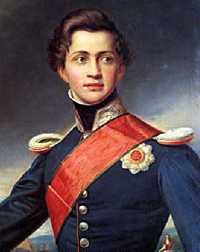 SKC Films Library SKC Films Library |
| SKC Films Library >> General and Old World History >> Greece >> 1821-1913 |
 King Otho King Othothe first King of Greece Prince Otto Friedrich Ludwig was born in Salzburg, Austria, on June 1, 1815, the second son of Louis I, King of Bavaria, and Teresa of Saxe-Altenberg. In 1832, Prince Otto was chosen by the Conference of London to assume the newly-created throne of Greece. He arrived at Nauplia, then the capital of independent Greece, on February 6, 1833, and immediately endeared himself to his new subjects by adopting traditional Greek clothing and Hellenizing his name to "Otho." Because he was not yet eighteen, Otho initially ruled through a regency council composed entirely of Bavarians under the presidency of Count Josef Ludwig von Armansperg. Although Greeks were reluctantly willing to accept rule by non-Greeks in order to get their country politically and economically stable, they quickly became angry over the regency's complete disregard for Greek wishes and customs -- the armed forces were inundated with hundreds of Bavarian mercenaries, the educational system was structured according to German prototypes, and judicial and legal reforms were based on western European codes and practices with little consideration for existing customary law. To make matters worse, the Bavarian regency implemented taxes that were significantly higher than any imposed during Ottoman rule. In addition to discontent amongst the Greeks, the regency also had to contend with internal quarrels, which led in 1834 to the recall by King Louis of G. L. von Maurer and Karl von Abel, who had been in bitter opposition to Armansperg. Open revolt broke out soon after, and the money obtained from foreign loans had to be spent on restoring order rather than on improvements to the new nation's infrastructure. This led to even more taxes, which naturally led to even greater public resentment. The fact that King Otho refused to convert from Roman Catholicism to Greek Orthodoxism added even more fuel to the ever-growing fires. Otho came of age on June 1, 1835, but, on the advice of his father and under pressure from Great Britain and the House of Rothschild, each of which had huge financial stakes in Greece, he retained Armansperg as Chancellor of State. State spending continued to increase, however, due in large part to Otho's determination to convert Athens into a modern capital city. Although Greece's infrastructure was being greatly improved, that improvement had to increasingly rely on foreign intervention for financing, which of course meant that taxes remained consistently high. In 1837, Otho visited Germany, where he married Princess Amalie of Oldenburg. She proceeded to make herself unpopular by interfering in the government. The fact that the marriage never produced any heirs also contributed to her unpopularity. The first action Otho took after returning to Greece was to dismiss Armansperg, who had by then lost support from the country's "bankers." Unfortunately, Otho chose to replace Armansperg with another Bavarian rather than a Greek, so the people remained dissatisfied. He made matters even worse by continually refusing to grant a constitution. On September 3, 1843, discontent with King Otho and his reign culminated in a coup d'etat headed by the leaders of all three major opposition groups (known as the "English." "French," and "Russian" parties to reflect each one's affiliation). Otho ultimately conceded to the principal demands of the insurgents, and a constitution was promulgated in March of 1844. Unfortunately, Greece's new Parliament was quickly divided into a number of factions based primarily on adherence to one or other of the great powers who made Greece the arena of their rivalry for control of the Mediterranean. Otho tried to counteract the effects of political corruption and incompetence by overriding the constitution to which he had sworn. With Greeks now having some control over their own government, Otho's reign was finally able to proceed with some measure of peace and content. That relative calm ended in 1853, however, when Otho agreed to join Russia's war against the Ottoman Empire in an effort to bring Greek-populated areas of Turkey under Greek control. The war was a disaster for both Russia and Greece, and Greece was once again forced to accept intervention in its affairs by Great Britain and France, both of which were allied with Turkey. Although King Otho's consent had been given under protest as a concession to popular clamor, the people held him personally responsible for Greece's failure. By 1862 the Greek people had had enough of Otho's rule, and the military staged a coup d'etat in October of that year. Otho's European supporters urged him not to resist the coup, and he and his wife returned to Bavaria aboard a British warship. Since Otho had no legitimate heirs, the choice of successor was left to the European powers that had been bankrolling Greece. They ultimately chose Prince Christian William Ferdinand Adolphus George of the Danish Glucksburg dynasty, who assumed the throne as King George of the Hellenes in 1864. After returning to Bavaria, Otho and his wife took up residence in the palace of the former bishops of Bamberg, where he died on July 26, 1867. SEE ALSO |
| SKC Films Library >> General and Old
World History >> Greece >> 1821-1913 This page was last updated on June 01, 2017. |